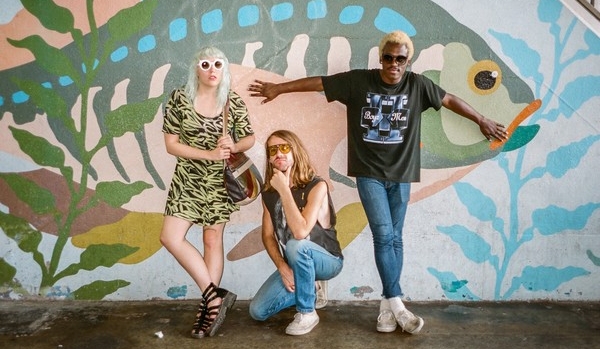“I try to write songs that I like and are the kind of music that I like,” says vocalist/guitarist Jason Powell. “I’ve always loved surf rock stuff, but I like a lot of different kinds of instrumental rock’n’roll. It wasn’t a super conscious decision to get away from that kind of stuff. We were writing other things as well.”
On paper, the aforementioned stylistic offerings seem to anticipate a nostalgic throwback act. However, even though Guantanamo Baywatch actively channel the music they enjoy listening to, they don’t settle with a tired imitation, nor a cheesy rip-off.
“When you’re making that kind music, you have to be super careful,” Powell adds. “There’s a lot of kinds of music that some people would say are similar to our band that I don’t really like. I’m not into psychobilly; I’m not into revivalist weird country/folk stuff. You have to figure out what it is about those old songs that you really like. It can be so easy – the formula’s there, it’s been done a thousand million times. But, you have to seek out the little bits, like, ‘Oh this is the key to the thing that I really like about this song or this genre,’ and hopefully write your own songs. Use those old things as inspiration, but don’t try to re-do it.”
On top of the stylistic diversification, Darling… It’s Too Late was recorded in a different manner to Guantanamo Baywatch’s previous two albums. Namely, they waved goodbye to the home studio and hooked up with Ed Rawls (Black Lips, The Coathangers) at Living Room Recording in Atlanta. It’s not as though they’ve embraced digital manipulation, but Powell says it was time to move on from the lo-fi setup.
“A lot of people listen to [old rock’n’roll] music and they think it’s really lo-fi, so they try to record it in that way. The thing is, back then when they were recording that music, they weren’t trying to be lo-fi. They were trying to be as hi-fi as possible. They just had old gear. It was new then, but it was different kinds of gear and I think that’s a big mistake people make – trying to make it super lo-fi sounding. I know that in the past, I’ve totally fallen into that. That’s one way to do it, but with the new album, we tried to do it differently.”
Before Darling… It’s Too Late hits stores, Guantanamo Baywatch will arrive on our shores for the first time. The Australian east coast climate is more conducive to surf culture than the band’s native Portland, but it seems that’s of no great consequence. In spite of surf music’s formative influence on Guantanamo Baywatch, the band members aren’t actually surfers.
“Both Chris and I skated a lot,” Powell says. “I grew up in Seattle and you actually can surf up there, but it’s not what people think of when they think of surfing. But for me, surf-rock is really not about surfing [anyway]. I think honestly that music had nothing to do with surfing. That was tagged-on later by record labels or a promotion company. At the same time as rock’n’roll was popular, Californian surfing was too. So they mashed those things together.”
Meanwhile, when it comes to surfing the touring circuit, Guantanamo Baywatch are pros. Having spent the last five years trekking all over the US, they’ve built a reputation for wild and unhinged live shows. Powell can’t deny things tend to get a bit freaky onstage, but he says the rough-and-tumble performance style isn’t the least bit contrived.
“When you’re on the road you’re playing every night, you’re tired, you’re getting totally fucked up, playing drunk and a lot of us playing is just like muscle memory. It’s loose, but if I had a choice I’d play it perfect every time. Most of our band time is on the road playing live, so when you play that way a lot of it is intuitive and you’re just trying to get through a set. A lot of your energy is being put towards engaging the audience and having fun, then also trying to wrestle with some shitty gear or a shitty sound system. But the looseness is not on purpose.
“I totally believe in performance,” he adds. “If you’re a band and you’re expecting the audience to really get into your show, to dance and to have a good time, you should probably be doing the same thing. I still get scared or tripped out when we get up on stage. When you feel that way, you automatically start going into a more manic mode. It’d be really hard for me to play standing still. I don’t think I could do that.”
BY AUGUSTUS WELBY

